World War One: Death of a Boy's Own hero
- Published
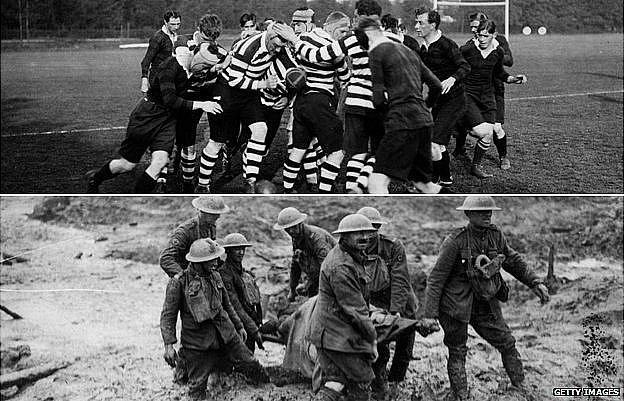
Edgar Mobbs swapped the playing fields of England for the killing fields of Flanders
His death was as fitting as it was tragic. Charging the blazing enemy guns, leading his men in one of the most terrible battles of World War One.
Edgar Mobbs was 6ft tall, athletic and square jawed. He excelled at sport and captained Northampton and England at rugby.
He raised a 250-man unit to fight in the war, went from a private to its commander and inspired utter devotion from his comrades.
He even appeared in the Boy's Own Paper in 1913, in an interview about his sporting prowess.
His great-nephew, also named Edgar Mobbs in his honour, says: "His men loved him, he was always kind and caring and looked after them and therefore he was one of those great leaders.
"The MP Ryland Adkins said at the time 'Northamptonshire in time of peace produced no finer sportsman and in time of war no finer soldier'."
At first though, Mobbs' star was slow to rise.
Born in Northampton in 1882, raised in Olney, Buckinghamshire and schooled in Bedford, his on-field education was initially disrupted by a knee injury.
A spell in the car sales business followed and it was not until 1903 that he returned to local rugby.
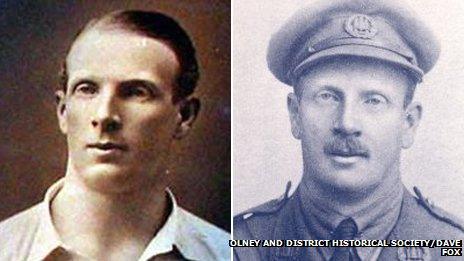
Mobbs' personality and talent showed both in sport and in the war
Progress after that was rapid. He joined Northampton Saints in 1905 and become captain within two years.
In 1908, he also led an East Midlands side to a legendary victory over the Australians, the tourists' only defeat that year.
England called and Mobbs earned seven caps, one as captain.
"It is no exaggeration to say he is one of the most celebrated names at the club and indeed in the town," Chris Wearmouth, of Northampton Saints, said.
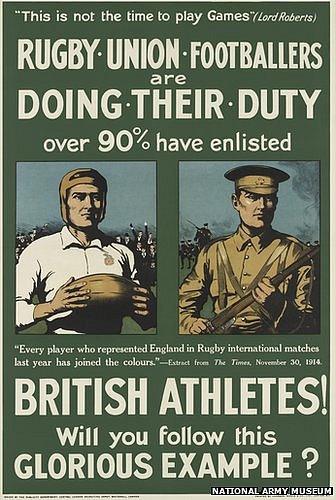
Sportsmen were targeted by recruitment drives
"As a player and a character he was ahead of his time. After his first England cap - a defeat at the hands of Australia with Mobbs scoring the only try - he was openly critical of the way the game had been handled.
"Eight players, including Mobbs, were initially dropped for the next match but Mobbs was reinstated and not dropped for the rest of the season."
And his concern did not stop with England.
Mr Wearmouth explains: "During a tour by the South African team, Mobbs became incensed at the way they were being treated, corners being cut at every opportunity.
"He publicly criticised the Rugby Football Union and the South African team sent him a signed photograph as a thank you."
'Excellent leadership'
Mobbs retired from playing in 1913, aged 30. He hardly had time though to settle back into the car business before war broke out.
Refused an officer's commission because of his age, he joined up as a private.
But fate had bigger plans.
Councillor David Mackintosh, leader of Northampton Borough Council, explained initial recruitment in the area was poor, because many men locally had full-time jobs.
"So, the recruitment committee needed a local hero to encourage men to sign up," he said.
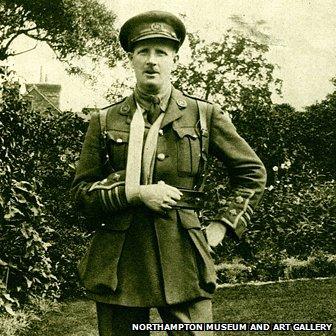
Mobbs was injured twice but always went back to his men
"And, with Mobbs' excellent leadership skills and positive attitude, this made him the perfect candidate for the job.
"Mobbs addressed a large crowd at one of the Saints' games and had over 200 men agree to volunteer after hearing his persuasive speech.
"He was so successful in driving recruitment that Northampton had one of the highest recruitment rates in Britain at the time. The volunteers then went on to form what became known as the Mobbs Own, which consisted of 264 men."
These men came to form the backbone of the seventh battalion of the Northamptonshire Regiment.
Wounded twice
Henry Grierson, who was one of the volunteers, later recalled: "The most extraordinary thing about Edgar was his personality.
"He could walk into a hotel, for example, and in a few minutes would be master of the whole show."
True to form, within 18 months of joining as a private, Mobbs was battalion commander.
The unit was battered at the battles of Loos, Somme, Arras and Messines. Mobbs was wounded twice, Mentioned in Despatches twice and awarded the Distinguished Service Order, second only to the Victoria Cross.
During periods away from the front 'resting', he organised rugby matches between service teams.
But, it was the nightmarish killing field of Passchendaele where the war finally claimed Edgar Mobbs' life, on 31 July 1917.
Mr Mackintosh said: "Mobbs led a platoon in hand-grenading a German machine gun nest near Zillebeke.
"The fighting was intense and Mobbs was hit and died soon after.
"His body was never recovered so his name features on the Menin Gate memorial."
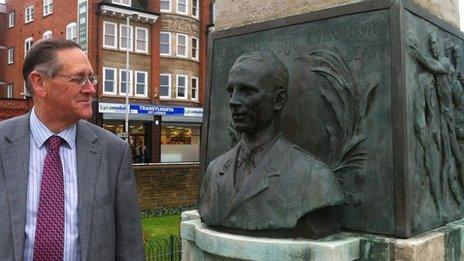
A memorial to Mobbs was funded by public subscription and still stands
Edgar Mobbs says his great uncle's memory endured: "In my younger days, as I would go around the town, people would come up to me when they heard my name and tell me they had served with Edgar and tell me all about it.
"I have had that for the majority of my life but it is an honour to be linked with him.
"He must have been quite a character. Kind, generous, would help anyone in trouble. He supported his men, whether it was a rugby player in difficulties or injured men in war.
"He was obviously much loved, much liked and must have been a really great man."
On 10 February 1921, the first Edgar Mobbs Memorial Match was played in Northampton between the East Midlands and the Barbarians, a tradition which continues to this day.
That summer the Mobbs Memorial, funded by national donations, was unveiled in Northampton's Market Square. Among the thousands attending were the 85 survivors of the original "Mobbs Own".
In the 1930s the monument was moved to be near the town war memorial in Abington Square.
Follow the story of Walter Tull, the Northants' footballer hero and hear Dan Cole recount the tale of the Leicester Tigers' war.